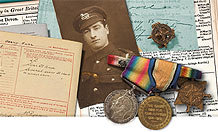Guest Blog
Welcome to the new Genes Reunited blog!
- We regularly add blogs covering a variety of topics. You can add your own comments at the bottom.
- The Genes Reunited Team will be writing blogs and keeping you up to date with changes happening on the site.
- In the future we hope to have guest bloggers that will be able to give you tips and advice as to how to trace your family history.
- The blogs will have various privacy settings, so that you can choose who you share your blog with.
Official Blogs
Another Successful Webcast
I've commented before that, although my monthly webcasts are open to anyone, with any question at all, they seem weirdly, to end up following themes. This time, the theme was very much one of technique. Everyone's enjoying having more and more access to records on-line, but many seem unsure how to use them properly.
Genes Reunited is doing so very well by collecting a formidable array of ‘data sources' of all types of genealogical records, and explains very well what they all are, but no amount of care on the site's part stops a problem arising. The problem is that, once a website has gained a certain amount of genealogical records, people may have the tendency to think that the website must contains all the relevant genealogical records they might ever want to use. And of course, that cannot, and can never, be the case at all.
The moral is, use the records on Genes Reunited as much as you can, but bear in mind that the archives are still full of undigitised original records that you can and should use. At present, there seems to be a real problem with archives having their budgets and staffing cut back or even withdrawing some original records from view because they are now available on-line. It's a slippery slope and one that we must all, as genealogists, do all we can to prevent. Archives are the best place to learn and meet people - archivists and record agents - who are genuinely knowledgeable about the material, and how it works.
Coming back to this site, I am finding from the webcasts that a lot of people try to use the records on the site, without realising that the birth, marriage and death indexes are just that - indexes to the original certificates that are held by the Registrar General. Having found the reference to the certificate you want, you need then to order it from then, using their website www.gro.gov.uk/gro/content/.
The marriages usually give you the parties' exact ages, and the names and occupations of their fathers. The former is immensely useful when looking for birth records: the latter two pieces of information are very useful points of reference for determining whether a birth certificate, once obtained, is the right one.
A problem arises when there is more than one likely birth record. People, understandably, don't want to fork out the hefty £9.50 the Registrar General is now asking for each certificate. Before 1911, you can often use censuses to work out which entry is likely to be right (and which aren't). However, in many cases, there is no alternative to buying more than one certificate, so you can not only gain the invaluable information on the document, but also be absolutely sure that the others are not the right ones. You may not lose out completely, for it may turn out that one or more of the other ones relate to cousins.
This is not an advert on behalf of the Registrar General, but it is a reminder to take every opportunity you can to go to archives. Try going to your local archives even if you don't have any ancestors from the area - you could try researching your house's history instead. Show your support, learn from the remaining staff, and do your bit to make sure that these utterly invaluable resources stay open for generations to come.
Comments
|
Send Message |
Has the cost of a certificate order on line from GRO gone up?
The last one ordered (credit card statement date 16 Jul 2011) cost £9.25, not £9.50. Thank you |
|
Send Message |
What have they done to the 1901 censuses? prior to them it was possible to see who was who but the 1901's are just blank. Is it the same for every one or is it just me? I'm have Windows 7 :-(
|

